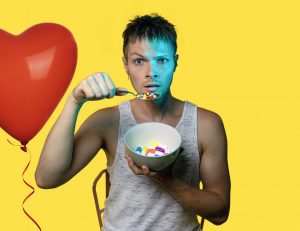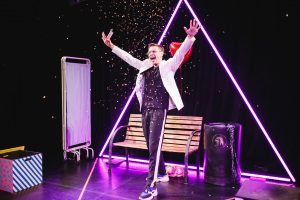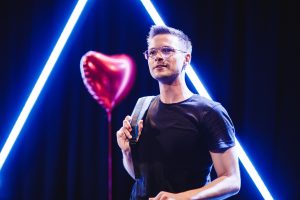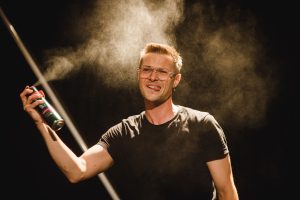Actor and theatre-maker Nathaniel Hall, spoke to us in the middle of his tour of First Time, an autobiographical theatrical piece about how his first sexual experience at the age of 16 resulted in him contracting HIV. First Time seeks to educate and eradicate the stigma which comes along with Aids and HIV, which Nathaniel says, “plagues people’s lives” over the physical symptoms. As well as this performance, we discussed the actor’s recent appearance in Russell T Davies’ upcoming drama Boys, about the Aids epidemic.
How did last night’s show go?
Oh, it was fantastic. It was a sell-out last night which is amazing, and we had a really beautiful warm audience here in Newcastle which is really nice. We’ve had a few days off so it’s always nice to get back up on the stage and go, ‘Oh yeah, I still remember the show.’ No matter how many times I do it, there’s still that panic just before I go on stage that I will have forgotten everything.

First Time is such an interesting and poignant concept…
The show came about in 2017 when I had a bit of a mental breakdown and was partying too much. The drugs, alcohol and that kind of scene had taken over my life. I caught myself in the mirror a few days after a house party and just thought, ‘I don’t recognise this person anymore.’
I realised I was doing this to mask pain and self-medicate. I vowed in that moment that something needed to change in my life and I immediately knew what it was: I was holding a secret. When I was 16, the first relationship I entered into was with a guy older than me and as a result of that, I contracted HIV. I found out about two weeks before my 17th birthday and carried that secret for 14 years. I didn’t really tell many people – my family didn’t even know – and that’s what was plaguing my life and my career. I started to work towards making the show which forced me to tell my family. They’re a very loving, accepting family and I’d tried for many years to tell them, but it was going on this journey which made me, because I was going to go public. The show premiered in 2018 and went stratospheric – it was a bit of a shock! I got an interview with BuzzFeed News in the lead-up to making the show and at one point that was trending higher than Jennifer Anniston’s bangs, which is my claim to fame now. After that, it took me to BBC News, BBC Breakfast and Radio 5 Live. The story itself – not just the show – captured the public’s attention in a way we weren’t expecting. There was a mad rush of people wanting me to tell my story in late 2018 and then after having made the show and it having been a success, we took it to the Edinburgh Fringe and were just amazed by the phenomenal response. People keep saying the story is really remarkable and it’s obviously impacting people in a really positive way which is amazing.
Do you find that reliving the story as often as you do is part of your recovery process?
 Yeah absolutely. There is some research that says it’s not very healthy for autobiographical performers to live their trauma out on stage every night, but actually going through the process of making it, I have learnt a lot of things about me and found a lot of answers as to why things have happened in my life. The show itself is actually a very theatrical presentation so it’s a performed version of me and I go through a whole ritual before the show to distance the real Nathaniel from the show Nathaniel, which is one way which really helps protect me while allowing me to tell the story. There’s something really powerful about a story being told by the person whose story it is, because throughout the show, the audience is brought into this world where it’s very funny and very fast-paced, providing this false sense of security. But then there are moments where the audience is reminded, ‘Oh, this is his real life.’ And that’s lets people reflect on their own attitudes towards HIV, LGBT people and all these issues.
Yeah absolutely. There is some research that says it’s not very healthy for autobiographical performers to live their trauma out on stage every night, but actually going through the process of making it, I have learnt a lot of things about me and found a lot of answers as to why things have happened in my life. The show itself is actually a very theatrical presentation so it’s a performed version of me and I go through a whole ritual before the show to distance the real Nathaniel from the show Nathaniel, which is one way which really helps protect me while allowing me to tell the story. There’s something really powerful about a story being told by the person whose story it is, because throughout the show, the audience is brought into this world where it’s very funny and very fast-paced, providing this false sense of security. But then there are moments where the audience is reminded, ‘Oh, this is his real life.’ And that’s lets people reflect on their own attitudes towards HIV, LGBT people and all these issues.
How are you, health-wise?
Great yeah! HIV is a fully-treatable condition now. When I was diagnosed 16 years ago it was still a chronic illness so I was told that I had a life-expectancy restriction, whereas now it’s classed as a long-term manageable health condition. Now anyone living with HIV on effective medication, will lead a long and healthy life-expectancy the same as our peers – maybe even longer, some studies are suggesting. The medication also makes me undetectable, which has been proven to mean that we can’t pass on the virus. You might often hear the phrase, U=U (undetectable=untransmittable) which is the new campaign to get the information out there that if you’re on effective medication you’re not a risk to sexual partners in any way, shape or form. That information is reframing my own relationship with my diagnosis, my body and my sexual relationships because it’s relatively new; that’s only come out within the past two years, so I’ve lived my whole life with this idea that I’m potentially a danger or ‘infectious’ (I don’t like that word) to other people, but I’m not. In terms of my physical health I’ve never been better. Going on tour is gruelling but it means that I’ve got a focus and a drive, and it makes me look after my body and get enough rest and sleep. I think people come away from the show understanding that HIV is a highly stigmatised disease and it’s more about the psychological impact and the shame that people feel from societal attitudes towards it, rather than the physical side-effects, that really plague people’s lives.
You’ve recently finished filming for the Channel 4 series, Boys. Was it emotionally challenging for you given the subject matter?
It was interesting because my character’s storyline is quite different to my own personal story. In that sense it was made easier for me but the script read-through and just reliving and being reminded of the devastating impact HIV and Aids has had on the queer community was difficult. It’s not exclusively a gay man’s disease – we are less than 50% of people suffering from it, so it does affect the heterosexual population – but Boys very much focuses on gay men. I have friends who are older than me living with HIV and they’re the only surviving members of their friendship group. You’re talking 10-15 of them who have died, and every few months they just went to another funeral.
It also stars Olly Alexander, what was it like to work with him?
Olly is genuinely lovely. I remember going to gigs and fangirling over him and all of a sudden, I’ve got him on WhatsApp. When I found out the cast, I called my agent and I was like, ‘Have you seen who’s in this?’ Olly Alexander, Stephen Fry, Neil Patrick Harris, Keeley Hawes, Shaun Dooley and Lydia West – ‘What kind of dream am I in here?’ It’s a stellar cast and they’ve all been really lovely; it was a real honour and a privilege to see them work.
Had Russell T Davies seen your show then?
He hasn’t actually seen the show in its current form but one of his friends saw the original production when he was writing Boys and said that he needed to come and see it. He couldn’t make it in the end, so I shared some of my story with him. It was one of those moments again where I was sat in Caffè Nero with Russell T Davies and I was like, ‘What’s going on here?’ He’s genuinely interested in my story, in my show and the work that I do. He’s one of the patrons of George House Trust HIV charity in Manchester so there’s one or two connections between us. His producer did come and see the show and so did the director of Boys, but he promises me that he’s going to come and see it soon.
Boys is set to air this year on Channel 4.


